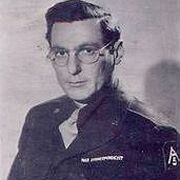Pat Frank (1908–1964)
Author of Alas, Babylon
About the Author
Disambiguation Notice:
Born Harry Hart.
Image credit: Courtesy of the NYPL Digital Gallery (image use requires permission from the New York Public Library)
Works by Pat Frank
The long way round 1 copy
Associated Works
Tagged
Common Knowledge
- Legal name
- Frank, Harry Hart
- Birthdate
- 1907-05-05
- Date of death
- 1964-10-12
- Gender
- male
- Nationality
- USA
- Birthplace
- Chicago, Illinois, USA
- Place of death
- Jacksonville, Florida, USA
- Places of residence
- Tangerine, Florida, USA
- Occupations
- journalist
government consultant - Organizations
- Jacksonville Journal
New York World
New York Evening Journal
Washington Times-Herald
United States Office of War Information - Short biography
- "Pat Frank" was the lifelong nickname adopted by the American writer, newspaperman, and government consultant, who was born Harry Hart Frank (1908-1964), and who is remembered today almost exclusively for his post-apocalyptic novel Alas, Babylon. Before the publication of his first novel Mr. Adam launched his second career as novelist and independent writer, Frank spent many years as a journalist and information handler for several newspapers, agencies, and government bureaus. His fiction and nonfiction books, stories, and articles made good use of his years of experience observing government and military bureaucracy and its malfunctions, and the threat of nuclear proliferation and annihilation. After the success of Alas, Babylon, Frank concentrated on writing for magazines and journals, putting his beliefs and concerns to political use, and advising various government bodies. In 1960 he served as a member of the Democratic National Committee. In 1961, the year in which he received an American Heritage Foundation Award, he was consultant to the National Aeronautics and Space Council. From 1963 through 1964 the Department of Defense made use of Frank's expertise and advice, and this consultancy turned out to be his last response to his country's call. His other books include Mr. Adam and Forbidden Area.
- Disambiguation notice
- Born Harry Hart.
Members
Discussions
Group Read - Alas Babylon in The 11 in 11 Category Challenge (June 2011)
Reviews
Lists
Awards
You May Also Like
Associated Authors
Statistics
- Works
- 13
- Also by
- 5
- Members
- 5,511
- Popularity
- #4,525
- Rating
- 4.0
- Reviews
- 159
- ISBNs
- 51
- Favorited
- 7















Randy’s doing nothing much in the family house in Fort Repose, Florida except drinking and charming local women–with the exception of his neighbor Florence, who suspects him of being a Peeping Tom–when his brother sends a cable with their code phrase, Alas, Babylon.
“As the minutes and hours eroded away, and no word came from Moscow, he became more and more certain that a massive strike had been ordered. He diagnosed this negative intelligence as more ominous than almost anything that could’ve happened.”
Randy begins grocery shopping while Mark packs up his family in Omaha to send them to Randy’s house and together with the neighbors, they navigate survival after a missile strike.
“The sight of war’s roseate birthmark on the sky choked back their words.”
A Review in Three Parts
The Time Traveler’s Version: five stars
Most likely, the ideal way to experience this book published in 1959 was to be born in 1935-1945. Much of the story has a strong philosophical tone best contextualized by the time period. I found it fascinating that Frank is partly aware of the influence of cultural epoch: “The incident was important only because it was self-revelatory. Randy knew he would have to play by the old rules. He could not shuck his code, or sneak out of his era.” However, there’s so much contained that is commentary on the conflicts of the era: the tiniest beginnings of Civil Rights and Equal Rights reflected in Randy’s relationships with women and the black family living next door remain strongly influenced by his chivalry and paternalism. Then there’s the general confidence people have that there is an ‘after,’ as in ‘after the government comes and restores everything," and the hope that nuclear strikes are survivable. In the decades since, our confidence in systems has diminished while belief in the survival of the strong has grown.
Nonetheless, it was an influential book during its time, and one of the few early apocalyptic that have the feel of reality as people then understood it. Frank was a career journalist who worked in New York and Washington and as a war correspondent during WWII and during the Korean War, and I felt like Mark’s experiences at the command post sounded real.
The Audio Version: five stars
The second best way–to those lacking access to Kemper’s time-mower–is to listen to the Audible version read by Will Patton. It won a well-deserved Audie in 2012 and was even more enjoyable than my reading. Patton is a fabulous voice actor and brought each word to life. Although it is mostly from Randy’s point of view, there are other view points, along with specific and general dialogue. Patton nailed almost every one, with the only exception being a “Boston Radcliffe” accent. The southern inflections sounded genuine and even a ten year-old girl was done well, but my favorite were his variations on the radio. From the verbal swagger of a radio jockey to the clipped tones of a Civil Defense broadcast, I too felt like I was listening to a broadcast. When Patton voiced Randy’s thought, “squashed his face like a potato,” I laughed out loud at a line I hadn’t noticed when reading. Clearly, a superior reader who won me as a fan.
The Modern Version: three and 1/2 stars
I tend to skim a lot, particularly toward the end of a book. It’s been a lifelong habit and likely one of the reasons I enjoy re-reading books. My first read through was done at my normal pace and I finished the book feeling satisfied. I started over with the audio, listening to Will Patton reading. I loved his voice acting–but started to hear the words more clearly. Frank is clearly ambivalent about equality of many kinds, and it is demonstrated in Randy’s philosophical musings, in privileged interaction with others, and with authorial choices in plotting. Let’s just say that in 2016, you wouldn’t give the black kid a spear and the white kid a gun, or have so many discussions about “going back to our Neolithic days.” While women get a whiff of equality in Randy's girlfriend, Liz, half-proposing and a woman being left in control of the United States, there's a lot ofne of Randy’s former lovers, Rita, who is basically characterized as an “exotic” “man-collector.” Then there's the bizarre episode where Mark's wife Helen has a 'mental break' and is psychoanalyzed by Liz and the Doctor.
I do believe none of the characterization is ill-intentioned, but as a modern reader, its the same-ol’ ‘-isms, and just because they seem benevolent doesn’t mean they aren’t tiresome. Further, we are now an audience that is fairly well educated on disasters, so some of the mistakes we witness Randy and the community make seem laughable.
My suggestion is to read it, but it’ll work best if you borrow a time-mower (keys hanging on a hook in the shed) or listen to Will Patton.
Many, many thanks to the people who suggested it when I was looking for an apocalypse, and a thousand thanks to Naomi who shared her audio copy.… (more)